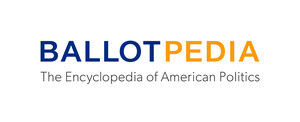MIDDLETON, Wis., Oct. 3, 2024 /PRNewswire/ -- Ballotpedia, the encyclopedia of American politics, announced today in their newly released state legislative competitiveness report that in 2024 2,227 (38%) of all state legislative seats are uncontested and have no major party competition. As a result, Republicans and Democrats are nearly guaranteed to each win 19% of all (5,807) November state legislative elections.
Over the last fourteen years, on average, state legislators faced no major party competition 39% of the time compared to 41% in 2022, 35% in 2020, and 34% in 2018. Click here to read Ballotpedia's full 2024 State Legislative Competitiveness Report.
"2024 feels to many like a hotly contested election year," said Ballotpedia's Editor-in-Chief, Geoff Pallay, "But the reality is, it's not for state legislators, who are facing an average level of competition this year as in the past 14 years. A rising tide of attention and coverage of politics has not translated to an increased number of contested elections."
Key Findings in the 2024 Report
- Tennessee (40%), Montana (38%), and Wisconsin (26%) had the biggest increases in competitiveness from 2022 to 2024.
- The three states with the biggest decrease in competitiveness from 2022 to 2024 are Rhode Island (47%), Massachusetts (33%), and Alaska (33%).
- Nebraska, California, and Montana are the three most competitive states this year. This is the first time since 2010 that Nebraska has been in the top three. California and Montana have been in the top three in 2012 and 2014, respectively.
- Massachusetts, Alaska, and Rhode Island are the three least competitive states this year. Massachusetts has been the least competitive state in six of the last eight even-year elections. This is the first time Alaska has been in the bottom three since Ballotpedia began gathering data in 2010. Rhode Island has been in the bottom three in 2014, 2020, and 2024.
About Ballotpedia's State Legislative Competitiveness Report
Published annually since 2010, Ballotpedia uses three criteria to determine state legislative competitiveness: open seats, incumbents in contested primaries, and races with major party competition, where Democrats and Republicans meet head-to-head in the general election. These figures are averaged to produce a State Legislative Competitiveness Index, wherein each state is assigned a score ranging from zero (least competitive) to 100 (most competitive).
About Ballotpedia
Ballotpedia is the nation's most trusted source of unbiased information on politics, elections, and policy. Founded in 2007, Ballotpedia has grown from a small group of dedicated volunteers working on a handful of ballot measures to an essential resource for voters, media, and researchers. Ballotpedia is a nonprofit organization dedicated to serving the public interest in creating an educated, engaged electorate, and building a strong, healthy democracy. For free access to 520,000+ encyclopedic, professionally authored, and curated articles, visit Ballotpedia.org.
SOURCE BALLOTPEDIA

WANT YOUR COMPANY'S NEWS FEATURED ON PRNEWSWIRE.COM?
Newsrooms &
Influencers
Digital Media
Outlets
Journalists
Opted In





Share this article